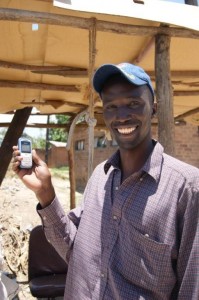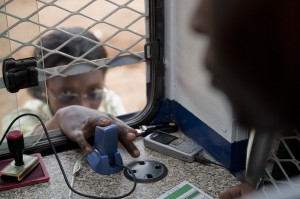What We’re Reading: “Rural and Agricultural Finance in the Spotlight at Cracking the Nut Conference”
A few weeks ago, Shari Berenbach, Director of USAID’s Microenterprise Development Office, wrote a blog post on the USAID’s IMPACTblog reported on a conference held in Washington that directly addressed the problems that face agricultural microfinance, as 600 million smallholder farmers currently live on less than $2 a day. Speakers at the conference emphasized new technology as a way to overcome previous obstacles and create opportunities for these populations.
 Dr. William Jack of Georgetown University used a specific example of M-PESA services in Kenya as an example of technology that decreases the cost of outreach and has a lower cost than other payment services, appealing to both banks and clients. Mobile phone banking can be utilized by microfinance institutions (MFIs) to increase their range of services while extending geographically. Another topic brought up by Paul Davis of Pragma Corp. was the utilization of branchless, or m-banking, to expand bank outreach to individuals in rural areas. This focused on Latin America, and Colombia in particular, as it has already taken hold there. In 2010, 360 million transactions per month were conducted in Colombia using branchless banking. The prevalence of mobile bank usage represents a shift in attitudes towards potential rural customers. “Cracking the nut” was the first step towards reaching larger numbers and tapping into secluded markets.
Dr. William Jack of Georgetown University used a specific example of M-PESA services in Kenya as an example of technology that decreases the cost of outreach and has a lower cost than other payment services, appealing to both banks and clients. Mobile phone banking can be utilized by microfinance institutions (MFIs) to increase their range of services while extending geographically. Another topic brought up by Paul Davis of Pragma Corp. was the utilization of branchless, or m-banking, to expand bank outreach to individuals in rural areas. This focused on Latin America, and Colombia in particular, as it has already taken hold there. In 2010, 360 million transactions per month were conducted in Colombia using branchless banking. The prevalence of mobile bank usage represents a shift in attitudes towards potential rural customers. “Cracking the nut” was the first step towards reaching larger numbers and tapping into secluded markets.
Opportunity International is at the forefront of utilizing the newest technology in the most isolated regions. Opportunity Kenya’s clients in remote locations have affordable, reliable access to their accounts and save valuable time by using mobile phone banking. Currently one third of all Opportunity loans disbursed in Kenya are via M-PESA. In Malawi, clients can use Opportunity ATMs equipped with biometrics to deposit money in their savings accounts, and 60% of Opportunity Malawi clients have access to mobile banking on their phones. Opportunity International currently has 300 banking access points across Africa, including 24 mobile banks in five countries, serving 79 communities, mostly in rural areas.
 Looking towards the future, Opportunity has begun piloting OpenSky technology, which enables field staff to verify and input account information, enroll new clients, perform cash transactions (such as loan repayments, disbursements and deposit mobilization), and record biometric information. This implementation will allow field employees to set up accounts and provide services to clients in the most isolated areas, even without direct access to electricity or internet, using the 3G services of cell phone companies. Using this innovative technology, Opportunity International is reaching rural clients, providing the financial services they need most to work their way out of poverty.
Looking towards the future, Opportunity has begun piloting OpenSky technology, which enables field staff to verify and input account information, enroll new clients, perform cash transactions (such as loan repayments, disbursements and deposit mobilization), and record biometric information. This implementation will allow field employees to set up accounts and provide services to clients in the most isolated areas, even without direct access to electricity or internet, using the 3G services of cell phone companies. Using this innovative technology, Opportunity International is reaching rural clients, providing the financial services they need most to work their way out of poverty.
To read the post on the USAID’s IMPACTblog, click here.